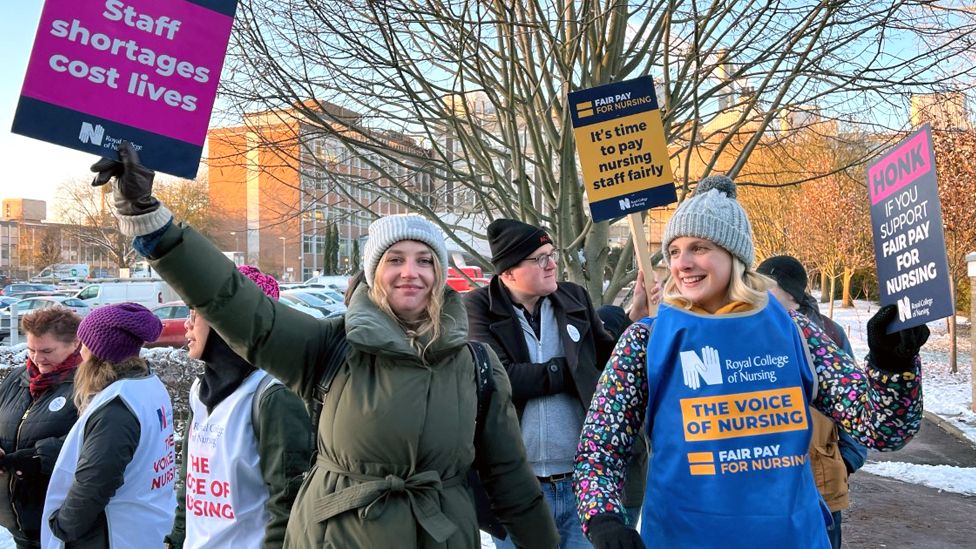ARTICLE AD BOX

Nurses in Cambridge join tens of thousands across the UK who are striking for better pay
Prime Minister Rishi Sunak has said that the pay offer to nurses is appropriate and fair, despite pressure from health leaders and some former Conservative ministers to rethink.
The Royal College of Nursing (RCN) went on strike on Thursday and is staging a second walkout on Tuesday.
And it has warned that more strikes could follow in the new year.
Tens of thousands of nurses took action across England, Wales and Northern Ireland, affecting many appointments.
Union sources have told the BBC that if there is no move to reopen pay talks after next week's action, then new strike dates will be announced before Christmas, with a series of walkouts likely in January.
The level of disruption could also increase, with nurses striking across more NHS trusts in England and for longer periods of time - perhaps over two consecutive days. Industrial action is also taking place in Wales and Northern Ireland.
'Time for pragmatism'
Former Conservative Party chairman Sir Jake Berry and ex-health minister Dan Poulter want the government to improve its offer.
Sir Jake told Times Radio: "It is time for pragmatism and talking between the government and the unions. I don't see why that is controversial.
"There is no do-nothing option except continued strikes. And I just think the cancellation of probably literally hundreds of thousands of non-urgent appointments yesterday has huge repercussions for an already-overstretched health service."
Mr Sunak said the government remained open to talks to negotiate pay with nurses, but that a demand for a 19% pay rise by the RCN is unaffordable.
Nurses received an extra 3% last year after the pandemic, and another rise recommended by a pay review body.
Speaking while on a visit to Belfast, Mr Sunak told BBC News NI: "The health secretary has always been clear that his door is always open for talks - we want to be reasonable, we want to be constructive.
"We've got enormous gratitude for all public sector workers for the job they do, and I know things are difficult right now.
"That's why the government is providing lots of support for people, particularly with energy bills."
The NHS Confederation, which represents hospitals, has urged ministers to act to avoid strikes in the new year, which it said could be "more severe" and co-ordinated with other health unions.
Former Conservative health minister Steve Brine told the BBC's World At One programme on Thursday: "Everyone needs to cool it, and I think sending it back to the pay review body to have a look would be a sensible answer."
Watch this video quiz to test your knowledge of nurses' pay
In England and Wales, most NHS staff have already received a pay rise of roughly £1,400 this year - worth about 4% on average for nurses.
The political situation in Northern Ireland meant there was a delay in processing the increase - but nurses should receive backdated payments before the end of the financial year.
The RCN wants a larger rise, of 5% above the RPI inflation rate, which currently stands at 14%, saying its members have received years of below-inflation pay increases.
The government says it has followed the recommendation of the independent NHS Pay Review Body, which said in July NHS staff should receive the £1,400 increase, with slightly more for the most experienced nurses.
The RCN has criticised this body for not being independent enough. It is made up mainly of economists and human resources professionals.
Welsh ministers said they were unable to enter pay talks without extra funding from the UK government.
In Scotland, the RCN's strike action was "paused" after ministers made a fresh offer worth just over £2,200, or 7.5%, a year for most NHS staff. Nurses have been asked to vote on that deal, with results due next week.

 1 year ago
12
1 year ago
12








 English (US)
English (US)